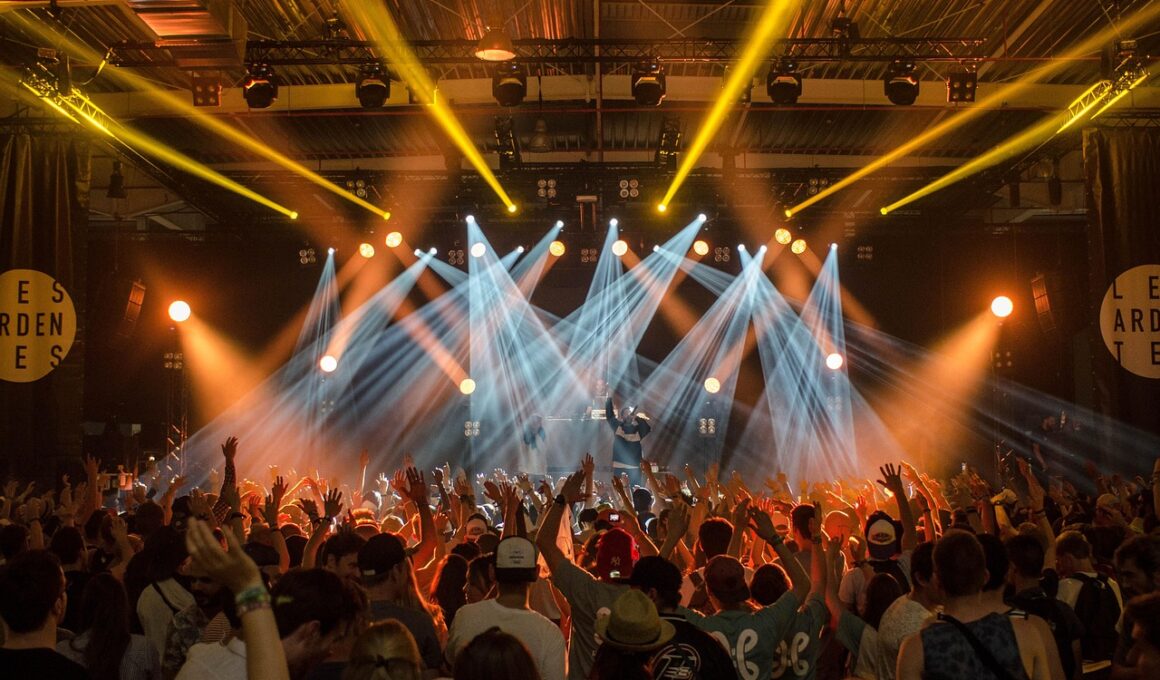Storytelling Through Events: Brands That Got it Right
In the competitive landscape of event marketing, storytelling plays a pivotal role. Brands that master the art of storytelling can create memorable experiences. Case studies highlight how effective narratives can engage audiences, ultimately leading to brand loyalty. Consider a brand like Red Bull, which successfully combines adventure with media to enhance its events. Their extreme sports events are not merely activities; they are experiences that narrate a thrilling story, appealing directly to their audience’s emotions and aspirations. The adrenaline rush associated with their events, paired with incredible storytelling, forms a powerful connection with participants. This unique approach allows spectators to relate to the brand’s message on a personal level. As event marketing advances, it becomes increasingly clear that brands equipped with compelling narratives can thrive. An excellent event should provide an immersive experience, inviting attendees to become part of the story told. To succeed in creating a connection, brands must weave their messages within compelling narratives. Storytelling creates not only engagement but fosters lasting impressions. Ultimately, this approach reinforces brand identity, inviting customers to stay connected and engaged.
Another impressive illustration comes from Airbnb, known for its unique yet relatable storytelling. Their events often highlight the experiences of hosts and guests, showcasing real stories behind each stay. Instead of traditional marketing pitches, they utilize authentic narratives that resonate emotionally. Capturing moments of joy, cultural exchange, and togetherness invites potential customers into the Airbnb community. The visual and verbal storytelling used during their events makes attendees feel a sense of belonging, whether through immersive experiences or creative installations. For instance, they create ‘live’ experiences of their properties during events, enabling guests to directly interact with what Airbnb offers. This strategy not only educates attendees about their services but also enhances trust in the brand. Furthermore, the atmosphere fostered during these events encourages sharing on social media, allowing guests to continue the narrative digitally. The synergy between live experiences and online storytelling showcases how brands can leverage event marketing effectively. When consumers share their experiences, they organically become brand advocates. Hence, every event presents an opportunity to strengthen community ties and expand the brand’s reach. The combination of storytelling and marketing contributes greatly to brand visibility.
Case Studies in Event Marketing
Another captivating example is Coca-Cola’s Share a Coke campaign, which beautifully integrates event marketing and storytelling. The campaign encouraged customers to find bottles personalized with popular names, enhancing the personal connection to the brand. Coca-Cola took this phenomenon further by hosting events where individuals could create custom bottles on-site, turning the process into an engaging storytelling event. These events not only attracted massive footfalls but also provided a platform for customers to share their stories. Attendees became part of the Coca-Cola narrative by celebrating experiences together. Moreover, this event created a buzz on social media, where guests shared images of their personalized bottles. This dual engagement, combining live interaction and digital storytelling, amplified their marketing impact significantly. As a result, Coca-Cola didn’t just deliver a product to consumers, but rather cultivated a shared experience that resonated deeply. Importantly, the event element transformed a simple purchase into a memorable story for attendees. The brand has effectively utilized the combination of emotions and storytelling, enhancing customer satisfaction and affiliation.
Another noteworthy approach is demonstrated by the beauty brand Glossier, which focuses on community-driven storytelling. Their brand events are designed to reflect the values of inclusivity and authenticity that resonate with their audience. By inviting loyal customers to participate in exclusive product launches, they create a sense of belonging within the brand community. Attendees are encouraged to share their thoughts and stories, transforming product launches into social gatherings filled with shared experiences. During these events, Glossier strategically integrates user-generated content, enhancing the storytelling aspect of their marketing strategy. This approach effectively amplifies the brand’s voice, as customer testimonials take center stage. Moreover, Glossier’s marketing emphasizes the personal connections formed during these encounters. Customers leaving events with tangible experiences foster deeper emotional ties to the brand. This momentum translates into powerful word-of-mouth marketing once attendees share their experiences with friends and on social platforms. In essence, Glossier excels at transforming conventional product launches into engaging stories crafted with community involvement.
The Power of Location in Event Marketing
Location choice also significantly impacts storytelling during events. For example, the iconic music festival Coachella is not merely about the performances; it’s about the overall immersive experience crafted through storytelling. Set in California’s picturesque desert, the festival creates a contextual backdrop that complements the narrative of each artist performing there. Coachella attracts not just music lovers, but those looking for a unique cultural experience. Its elaborate art installations and sponsored experiences add dimension to the storytelling that attendees can participate in, fully immersing themselves in the event. Storytelling at Coachella extends beyond just music; it embodies the culture, fashion, and lifestyle connected to the event. Partnerships with brands allow for curated experiences that align the event with relevant themes, enhancing engagement further. Attendees relate their personal stories through photos and interactions within that environment, resulting in a profound association with participating brands. The strategic combination of location, brand identity, and storytelling creates an unforgettable brand narrative. Each moment experienced contributes to this continuous, dynamic story, fostering an active relationship with attendees and amplifying brand visibility.
Furthermore, Nike’s events are another prime example of how storytelling propels brand success. Their highly engaging marathons not only promote fitness but weave narratives of inspiration and empowerment throughout. Athletes, regardless of skill, experience a profound journey; every race tells their personal story. By sharing testimonials and success stories during events, Nike emphasizes community support. Participants acknowledge their accomplishments while simultaneously contributing to a larger narrative about achieving fitness goals. Nike also engages with attendees through interactive experiences, allowing them to connect with the brand. This narrative-driven approach allows Nike to embed itself into the cultural conversation around fitness and health. The emotional connection formed during these events transcends basic consumer-brand interactions, fostering brand loyalty that lasts long after the event concludes. Furthermore, this storytelling reflects modern consumer expectations, as people increasingly favor brands that prioritize authentic connections. Nike successfully utilizes these events to maintain relevance in a competitive landscape. Ultimately, their approach illustrates that mastering storytelling can be transformational for brands in creating long-lasting relationships with audiences.
Conclusion and Future Directions
As demonstrated, successful event marketing integrates storytelling at its core. The examples of Red Bull, Airbnb, Coca-Cola, Glossier, and Nike showcase how brands have leveraged narrative techniques to enhance audience engagement. By creating immersive experiences, they not only capture attention but also foster lasting emotional connections. Storytelling transforms conventional marketing into an engaging dialogue between brands and consumers. Each event represents an opportunity to further elaborate a brand’s story while incorporating real-time consumer participation. Moving forward, brands should focus on aligning their narratives with audience values and aspirations, as these connections will drive deeper loyalty. The future of event marketing lies in innovation, where storytelling adapts alongside consumer needs. Furthermore, utilizing technology to capture stories from attendees can provide valuable insights. This interconnectedness enhances overall engagement and enables brands to share authentic narratives that resonate. Given the fast-paced evolution of event marketing, brands willing to embrace storytelling will undoubtedly stand out. This strategy should serve as a blueprint for brands while crafting impactful narratives that inspire and bring communities together.
Ultimately, event marketing success stories highlight how vital storytelling has become in enhancing brand visibility. The brands mentioned exemplify how effective narrative techniques foster passionate audiences. Inviting customers to participate creates profound connections, reinforcing the relationship between consumers and brands. Crafting these stories around collective experiences facilitates communal bonds that go beyond simple transactions. Moving forward, successful event marketers will continue to leverage storytelling as an essential tool. Additionally, they will embrace new technologies that can enhance these narratives, creating experiences that narrate the essence of their brands vibrantly and engagingly. Companies that aim to optimize event marketing must maintain their focus on genuine storytelling. Authentic engagement significantly influences consumer behavior and overall brand perception. As consumers crave deeper interactions, brands must be equipped to tell meaningful stories that inspire loyalty. Therefore, the integration of storytelling into event marketing is indispensable for growth and success, allowing brands to build a memorable legacy that resonates with their audiences.


